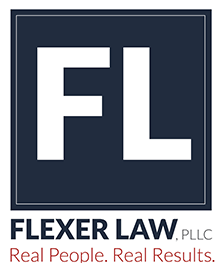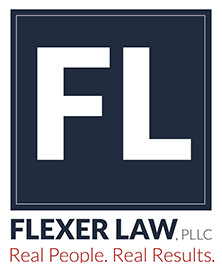
Chapter 7 Bankruptcy Attorneys in Nashville
Chapter 7 bankruptcy is the most common form of filing in the U.S. It is referred to as “liquidation” bankruptcy and is the simplest and fastest route to restoring financial control. It allows consumers to get a “fresh start” by wiping out many unsecured debts.
When you file Chapter 7, your creditors must leave you alone. This includes garnishments, phone calls, letters, and lawsuits. These actions must stop immediately through the court issuing an automatic stay.
At Flexer Law, we believe it is best to ask questions regarding your options and rights before filing for bankruptcy. Our bankruptcy team is here to inform, advise, and guide you in making this critical decision based on your financial situation, needs, and goals. With over 40 years in practice serving clients in Tennessee bankruptcy filings, we have become a trusted partner for individuals and families seeking debt relief through Chapter 7 bankruptcy for the Middle Tennessee region.
Schedule a free consultation with a Nashville Chapter 7 bankruptcy lawyer at our firm by contacting us online or at (615) 805-6374.
Chapter 7 Bankruptcy: What Is It?
A Chapter 7 bankruptcy allows you to wipe out or discharge unsecured debt, which are those not secured by collateral, like your home or car.
Unlike Chapter 13 bankruptcy, which involves creating a repayment plan, Chapter 7 typically requires the sale of non-exempt assets to repay creditors. However, many individuals can protect essential assets through Tennessee’s bankruptcy exemptions, such as their home, car, and personal belongings.
The most common examples of unsecured debt are:
- Medical bills
- Credit cards
- Payday loans
- Deficiency balances from repossessions or foreclosures
Some types of debts cannot be wiped out in Chapter 7. These include student loans, IRS taxes, criminal fines, restitution, and child support. In most instances, you would still owe these debts after completing Chapter 7.
If you also have secured debts such as a car or home, which you are making payments on, you may be able to keep this property if you can continue to make regular payments on the debt and remain current and up to date on the contract.
The Tennessee Chapter 7 process takes approximately four to five months from filing your petition to receiving your discharge. Typically, you will only have to go to court once, about 40 days after you file. Your employer is only generally notified in Chapter 7 if, for some reason, you owe them money.
Who Qualifies for Chapter 7 Bankruptcy?
To file for Chapter 7 bankruptcy in Tennessee, you must meet certain eligibility criteria, including:
- Passing the Means Test: This test compares your income to the median income in Tennessee. If your income falls below the state’s median, you likely qualify for Chapter 7.
- Demonstrating Financial Hardship: You must show that repaying your debts would cause undue financial strain.
- Completion of Credit Counseling: Federal law requires you to complete a credit counseling course from an approved provider within 180 days before filing.

Why Choose Flexer Law?
Put 40 Years of Experience On Your Side
-
$0 Down Until You FileWe can help you file your bankruptcy with no money down.
-
Free Consultations AvailableGet started on your case with a free consultation today.
What to Expect in a Chapter 7 Court Hearing
When you file for Chapter 7, you must attend a court hearing known as the "meeting of creditors" or "341 meeting." At this hearing, the bankruptcy trustee and any creditors who choose to attend will ask you questions about your bankruptcy filing, assets, debts, and financial affairs.
Although a court hearing can seem daunting, it's typically a straightforward process that your attorney can prepare you for, ensuring you know what to expect.
Tennessee State Exemptions
A common question from clients is, “Will I lose everything if I file Chapter 7?” The simple answer is no. It is unlikely. Your household furnishings, money in the bank, tax refunds, 401(k), and even equity you have in your home are covered by exemptions.
Exemptions refer to laws that protect certain types of property from being sold by the bankruptcy trustee to pay creditors. The idea behind exemptions is to allow you to retain the essential assets you'll need to rebuild your life post-bankruptcy.
Common Tennessee exemptions that may apply in Chapter 7 can include the following:
- Homestead: Protects equity in your home up to a certain amount, allowing you to keep your residence as long as your equity does not exceed this limit.
- Personal property: Tennessee law exempts personal items such as clothing, family pictures, and health aids, among others, up to a specified dollar value.
- Vehicle: You may exempt some equity in one vehicle, which can be particularly important for maintaining employment and managing daily transportation needs.
- Tools of the trade: Items necessary for your occupation or business can be exempt so you can continue to work and earn an income.
- Retirement accounts: Most retirement accounts, such as 401(k)s, IRAs, and pensions, are protected.
- Public benefits: Public benefits like Social Security, Veterans' benefits, and unemployment compensation are typically exempt from bankruptcy proceedings.
- Insurance benefits: Certain benefits, including life insurance proceeds and disability benefits, may be shielded from creditors.
- Wildcard: If you have property not covered by other specific exemptions, the wildcard exemption might be used to protect it.
Our bankruptcy lawyers can thoroughly review your situation to advise you on how Tennessee exemption law will apply to you.
What Does It Cost to File Chapter 7?
Your attorney fees at Flexer Law include everything you need to file your case:
- Bankruptcy court filing fee
- Up-to-date credit report
- Required credit counseling course fee
- Core attorney services
We know that money may be tight as you are going through the bankruptcy process. We allow you to pay in three monthly installments. Our firm offers a discount if you can pay attorney fees upfront instead of in installments.


